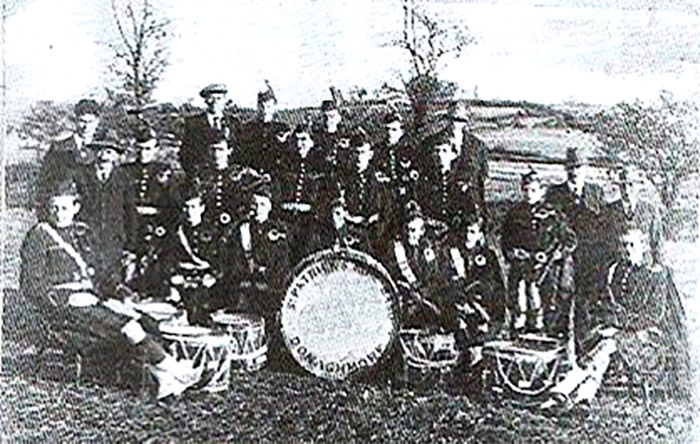
During the 1960s and 70s the Robert Armstrong Memorial Pipe Band dominated the Irish pipe band scene with one of their main rivals being St Patrick’s, Donaghmore. While both bands have long since departed the scene the Belfast-based RAMS as they were known remain revered with a considerable amount of information available compared to that of the St Patrick’s band who in their day were also trail blazers.
During the lockdown I contacted their former Pipe Major, Sean Faloon, and over a few months we were able to create this record of the band from their formative days in the 1920s until their demise in the late 1970s.
The picture at the head of this article is from the 1930s and the personnel are, back row left to right: John McShane, Tommy Devlin, Barney McGlade, Paddy Joe Donnelly, and Jimmy McElvogue. Middle row: Paddy Christie, John Fallon, Francie McCullagh, Tommy Gallagher, Jimmy McGurk, Pat Faloon, Pat McCann, Frank Comac, Paddy McRory and Tom Devlin. Front: Joe Comac, Frank Dunlop, Harry Weir, Paddy Corr, Joe Devlin, Paddy Gallagher and Frank McGurk.
The band was first formed in the early 1920s as Donaghmore Pipe Band with the encouragement of Master Daly who taught at the local Carland School. It appears that he had been taught the pipes by a member of the McCullough family who had a bagpipe-making business ‘Denis McCullough’ based at Howard Street, Belfast.
The band practised in the Ancient Order of Hibernian Hall which it shared with a local accordion band and in due course it took a court case to decide who should practice there and the pipe band lost out.
They started, like so many others, as a road band undertaking parades for the local AOH on St Patrick’s Day or their annual 15th August Parade as well as attending local sports meetings throughout County Tyrone and other events associated with parish life. Like other non-contest bands in their own and the local Unionist community, they would be relatively inactive for six to seven months of the year.
In the late 1920s the band recruited Pipe Major James McCormick as a tutor and in December 1929 this led to them competing at their first contest organised by the recently formed Dungannon Pipe Band Association (affiliated to the North of Ireland Bands Association or NIBA).
The contest was held in John Street Hall, Dungannon, and F. McCullough (Donaghmore) won the Junior Solo Piping while the band, tutored by P/M McCormick but under Pipe Major B McGlade, finished third out of an entry of five bands behind Dungannon Pipe Band (later to become Howard Memorial) and Omagh True Blues. The test piece was The Earl of Mansfield.
The band is also known to have competed in the Tyrone Feis and the Dungannon Festival against the likes of Dungannon.
Pipe Major McCormick had been a former Pipe Major of the 2nd Cameron Highlanders and the Cookstown Special Constabulary Pipe Band recruited him when he came to Coalisland, Co. Tyrone, to work in the local mining industry.
He led them to seven NIBA Championship successes from 1926 to 1935 with the band closing down around 1937. Pipe Major McCormick taught numerous other bands in the area such as Tullylagan and Dungannon and later still Upperlands, home, in later years, to All Ireland Senior Champions, Quinn Memorial.
P/M McCormick died suddenly at the age of 51 on the 26th October 1937 while preparing the St Patrick’s band to compete in the NIBA Championships. He was buried in the cemetery of Maghera Presbyterian Church in Co. Londonderry.
In the 1930s the band competed in the 2nd Dungannon Pipe Band Association contest which was held outdoor in the grounds of Dungannon Royal School on the evening of Wednesday 26th August 1931 when they finished second to Cookstown who were recognised as the best band in Northern Ireland at the time.
It was about this time that the band became known as St Patrick’s Pipe Band, Donaghmore, and were led by joint Pipe Majors Pat Faloon and Pat McGurk. They practiced for a while at the home of Barney McGlade at Tullydraw, Dungannon, while a new band hall was constructed nearby and completed in 1933. The band was attired in Black Watch kilts in these early days.
This suggests that they had reached a reasonably high standard in a relatively short time. Like so many other competing bands of the time they acquired the title ‘prize’ band. While they do not seem to have competed in any other NIBA competitions in the 1930s they are likely to have competed at some of the numerous contests held on Sundays at various fèisean, sports days etc. throughout the country.
- Read part 2 of this hidtory here. There is an extensive interview with Sean Faloon on the Piper’s Persuasion website. Check it out here.
-
Easy and Intermediate Level 2/4 Marches£2.50
-
Classic Strathspeys & Reels – Vol. 1 (A – F)£2.50
-
Bagpipes – DN5 – The Finest Bagpipe AvailablePrice range: £300.00 through £3,424.00